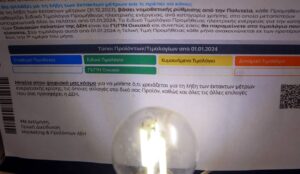The Public Debt Management Agency (PDMA) is scheduling its next market appointment for September, monitoring developments on the trade front and the global economy from a distance. Meanwhile, the PDMA is enjoying the significant narrowing of the Greek spread in international markets. In this context, the PDMA is expected to postpone next week’s scheduled bond re-issuance (July 16) and return with re-issuances on September 17.
Trump tariffs create market uncertainty
This week marks “D-day” for Trump tariffs, as the 90-day “pause” announced by the American president expires, although there are estimates for an extension. In any case, confusion and uncertainty prevail in international markets. The first Trump notification letters regarding his “retaliatory” tariffs have already begun to be delivered to governments, as have his familiar threats.
Therefore, it is clear that the “tariffs” issue is returning to the spotlight and, as recent history has shown, is capable of disturbing the currently calm waters of the markets.
High cash reserves allow PDMA strategic waiting approach
Since there is no need on the borrowing front, while cash reserves are maintained at high levels close to 40 billion euros, the PDMA believes there is no reason for any market moves during this period. It should be noted that the Greek state has already raised 93% of its total 2025 borrowing needs or 7.45 billion euros from very early this year, even anticipating the shock and awe that Trump caused on “Liberation Day.”
This was achieved through the following moves:
· Issuance of the new 10-year bond in January (4 billion euros)
· “Opening” of the 15-year and 30-year bonds in March (3 billion euros)
· Two smaller re-issuances in February and April (450 million euros total)
Of the six total planned re-issuances for the first half, two were conducted and four were canceled. For the second half, four are scheduled (July, September, October and November) and the first is expected to be canceled.
Greek spread at historically low levels
What is extremely important for the PDMA is the further narrowing that the Greek spread has recorded in European markets. Greece borrows just 74 basis points more expensively than Germany and at pre-debt crisis levels, just 3 b.p. more expensively than France, 9 b.p. more expensively than Spain and 25 b.p. more expensively than Portugal.
Meanwhile, while maintaining its best position against Italy, as the Greek state borrows 17 b.p. cheaper than Rome, the “competition” between the two markets has intensified. According to market sources, this constitutes a healthy and welcome development as the image of the European bond market is normalizing generally and the extreme valuations that had formed in the past are being eliminated.
Italian bonds gain ground in markets
For years, Italian bonds offered much higher yields as investors demanded compensation for the unstable political environment and large public debt. Now, investors are buying Italian debt, driven by Meloni’s market-friendly policies and faster economic growth.
Italian bonds have even entered the radar of domestic investors. “Greek investors currently prefer Italian bonds seeing the attractive yields and positive momentum they have,” a market player comments to the newspaper “Kathimerini.” The 10-year Italian spread against German bonds has narrowed to its lowest level since 2010 at just 91 b.p.
Bailout repayment strategy remains unchanged
Otherwise, nothing has changed in the PDMA’s strategy, with the plan for early full repayment of the first bailout a decade earlier than its normal expiration (by 2031 instead of 2041) proceeding normally. In December, repayments of installments maturing from 2033 to 2041 will begin, with the payment of 5.3 billion euros.
The increase in defense spending, according to information from “K,” does not change anything from the debt management strategy at least until 2030, despite the challenges facing international markets.




